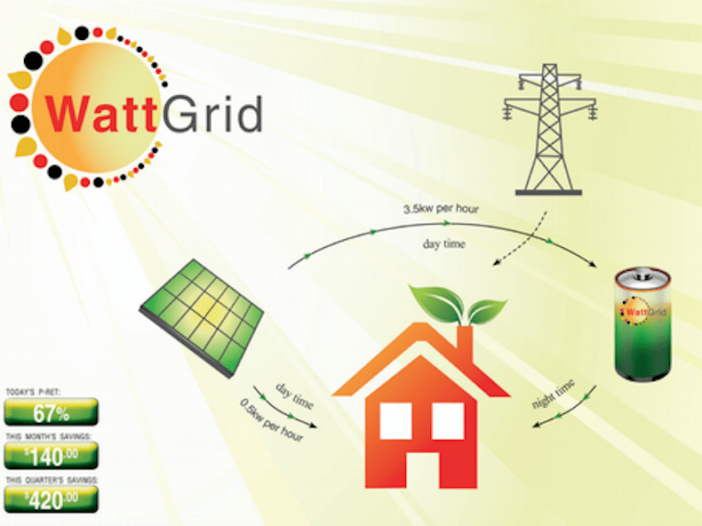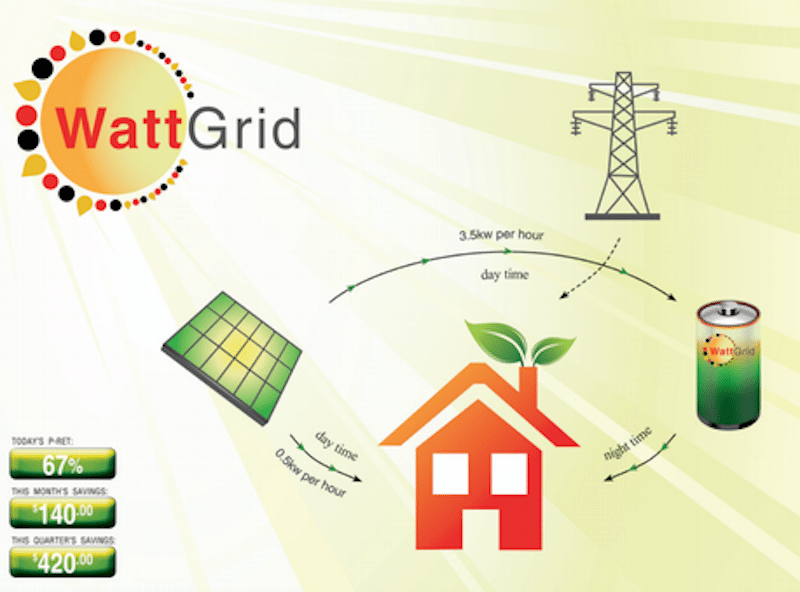
*This is an amended version of the original article. A table has been removed, due to the risk of prices listed on it going out of date, and the price of the WattGrid battery has been adjusted to $11,999, to include GST.
Another battery storage offering is set to launch onto the Australian market, targeting the nearly 1.5 million solar households looking to make the most of their rooftop solar generation. The 10kWh system – a local offering from Indigenous Brisbane-based company AllGrid Energy – is due to go on sale next week, and according to AllGrid, it will be the most cost-effective system on the market today.
a local offering from Indigenous Brisbane-based company AllGrid Energy – is due to go on sale next week, and according to AllGrid, it will be the most cost-effective system on the market today.
The home storage system – which will be launched in Adelaide next Wednesday, and marketed under the name WattGrid – comprises a tubular gel variant of lead acid battery, a hybrid (bidirectional) inverter, and a software “app” called WattsHappening, which allows the customer to monitor the unit in real time and control it remotely.
The system is designed to optimise solar PV self-consumption; with excess energy used to charge the batteries, and then the batteries used to supplement the house load when the PV energy is inadequate (you can see how this works in the chart below, which, it should be noted, was recorded in the Brisbane winter).

When PV energy output is insufficient to support connected loads, the system automatically gets energy from the batteries if there is sufficient charge. If the battery capacity is insufficient to meet consumption requirements, electricity will be drawn from the grid.
The WattGrid inverter also has a UPS function (uninterrupted power supply), so in event of blackout the UPS will support designated backup circuits.
To the cost; the battery system will retail for $11,999 (not including installation), a price which AllGrid says is well below current competitors, Including the Tesla Powerwall.
The company says the 10kW battery, when combined with 3-4kW of rooftop solar, will offer an average of 12-17kWh per day, or around 70 per cent saving on a household’s quarterly electricity bill.
AllGrid has been is in discussions with the Mayor’s office in Adelaide City Council, where it will launch the 10kWh product, to take advantage of the recently announced $5000 grant to Adelaide City residents and small business purchasing a storage system.
The company says it expects other councils to introduce similar incentives in the near future.
“Although Australia’s climate change policies and renewable energy industry are very much maligned at the moment, we are incredibly excited to be at the start of the wave of the storage revolution that is about to happen,” said AllGrid spokesperson Deborah Oberon.
“This is truly a game changing moment and it is with great pride we are releasing this as an Indigenous product thereby representing the union of Indigenous understanding of sustainability with modern technology,” Oberon said.
“Funding to this scheme has also been contributed to by the South Australian government. Currently up to $5000 rebate is available for the purchase of storage, and up to a further $1000 is available for the purchase of panels. With solar and storage in place, residents can expect to reduce their grid consumption by 50-70 per cent.
“We like to call this the Personal Renewable Energy target (P-RET)! We are hoping the South Australia initiatives will inspire other councils and state governments to implement similar programs.”
New energy storage products are in the pipeline, including AllGrid Energy commercial systems, which range in size from 100kW up to 1000kW.
Also on the commercial energy storage front, WattGrid says it has signed a partnership agreement with Sun Edison to fund its commercial offerings through Power Purchase Agreements, allowing them to offer the battery systems at a cents per kWh rate, rather than as an up front purchase.
WattGrid will be launched next week at the Tandanya Aboriginal Cultural Centre on Wednesday 2 September at 2pm, by South Australia’s minister for industry and innovation, and indigenous affairs, Kim Maher.

Sophie is editor of One Step Off The Grid and deputy editor of its sister site, Renew Economy. Sophie has been writing about clean energy for more than a decade.



